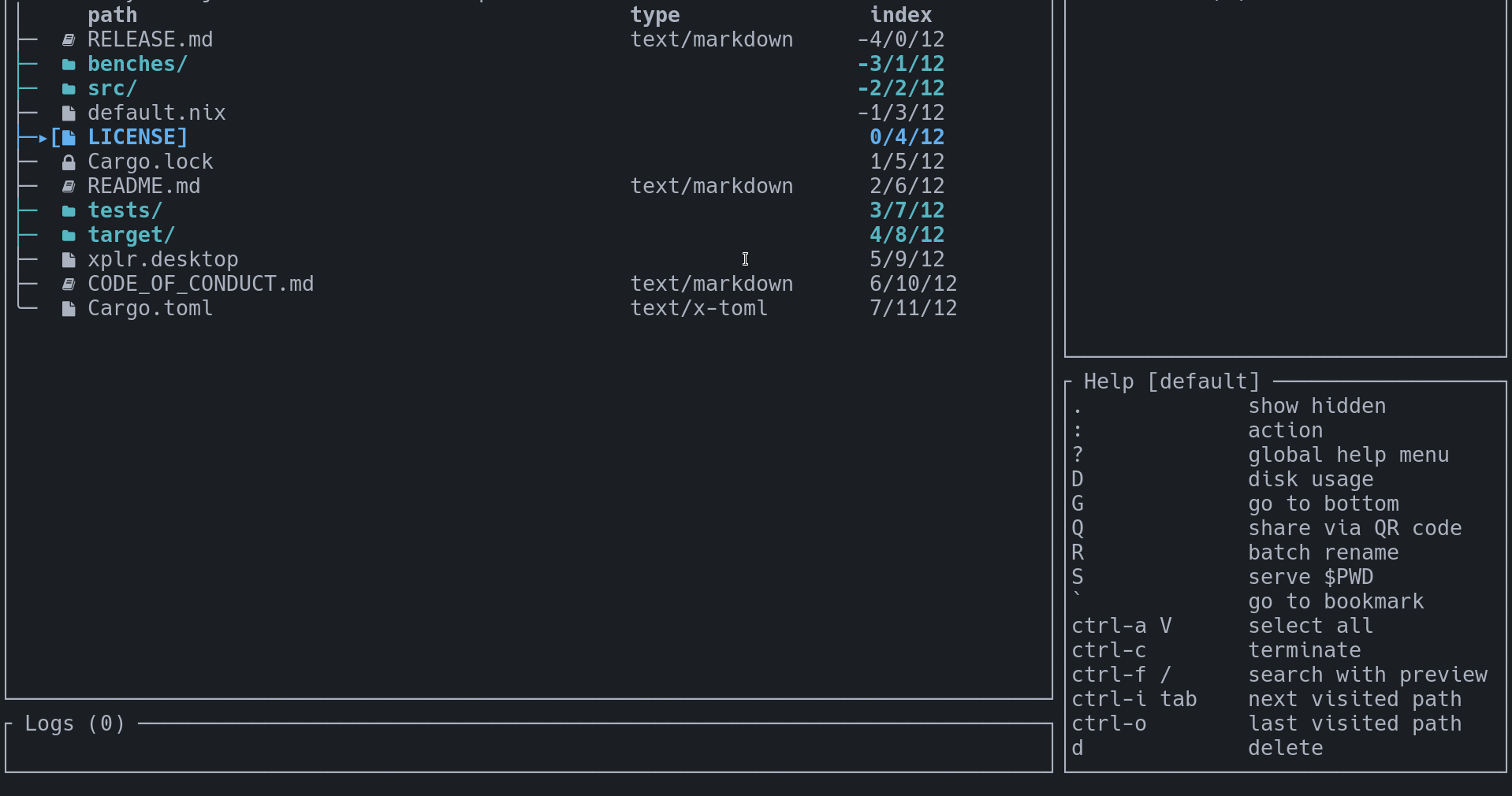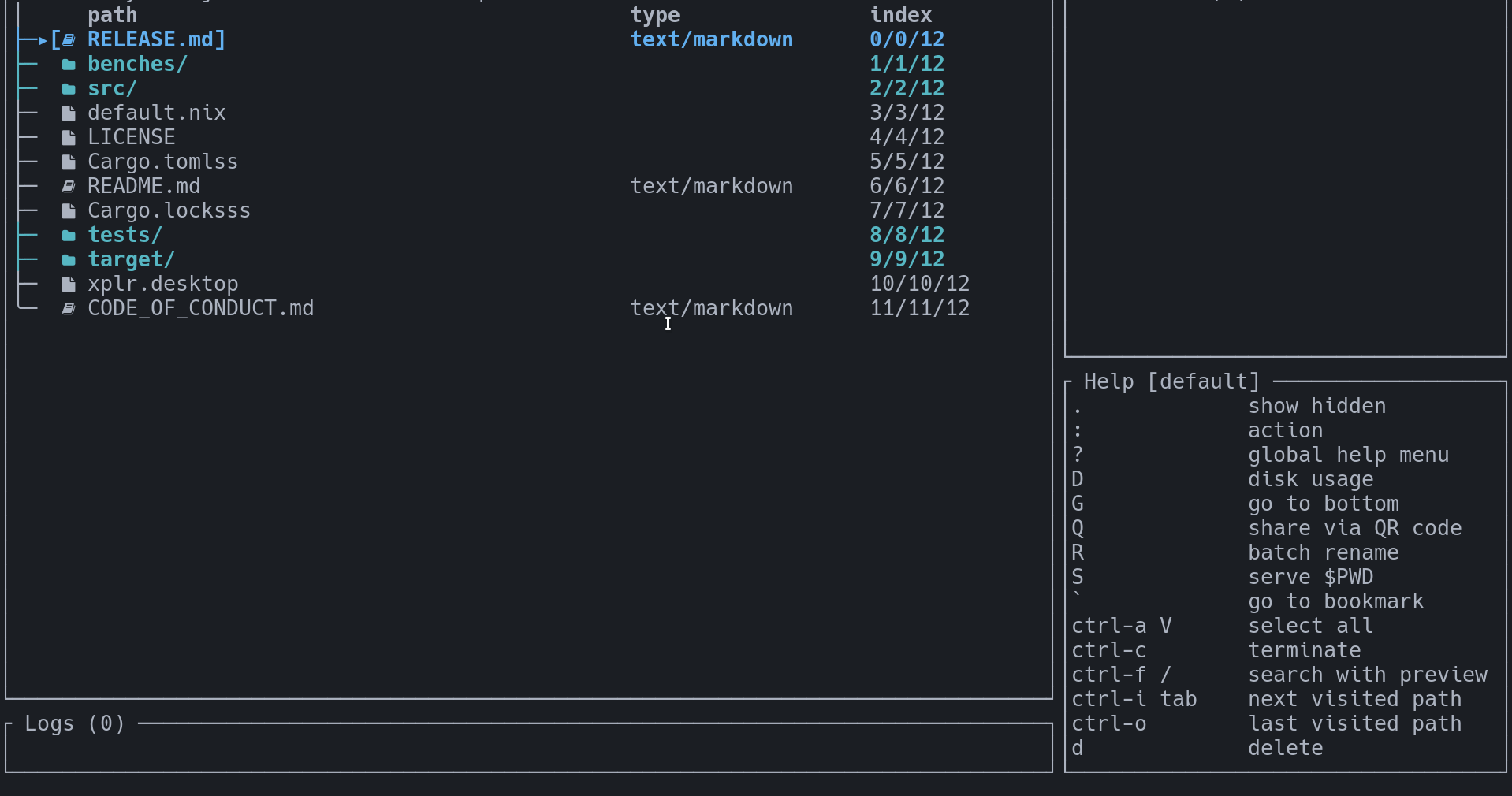Awesome Hacks
Here's a list of cool xplr hacks, i.e. snippets of code that you can just copy and paste into your configuration file, that are too small or niche for a full fledge plugins.
Do you have something cool to share?
Edit this file or share them here or let us know.
Spawn multiple sessions in different tabs (iTerm2)
Creating a new session that starts with iTerm2.
Expand for details
- Author: @lmburns
- Requires: iTerm2
- Tested on: MacOS
xplr.config.modes.builtin.default.key_bindings.on_key["ctrl-n"] = {
help = "new session",
messages = {
{ BashExecSilently = [[
osascript <<EOF
tell application "iTerm2"
tell current window
create tab with default profile
tell current session to write text "xplr"
end tell
end tell
]]
},
},
}
Bookmark
Bookmark files using m and fuzzy search bookmarks using backtick.
Expand for details
- Author: @sayanarijit
- Requires: fzf
- Tested on: Linux
xplr.config.modes.builtin.default.key_bindings.on_key.m = {
help = "bookmark",
messages = {
{
BashExecSilently = [===[
PTH="${XPLR_FOCUS_PATH:?}"
if echo "${PTH:?}" >> "${XPLR_SESSION_PATH:?}/bookmarks"; then
echo "LogSuccess: ${PTH:?} added to bookmarks" >> "${XPLR_PIPE_MSG_IN:?}"
else
echo "LogError: Failed to bookmark ${PTH:?}" >> "${XPLR_PIPE_MSG_IN:?}"
fi
]===],
},
},
}
xplr.config.modes.builtin.default.key_bindings.on_key["`"] = {
help = "go to bookmark",
messages = {
{
BashExec = [===[
PTH=$(cat "${XPLR_SESSION_PATH:?}/bookmarks" | fzf --no-sort)
if [ "$PTH" ]; then
echo FocusPath: "'"${PTH:?}"'" >> "${XPLR_PIPE_MSG_IN:?}"
fi
]===],
},
},
}
Persistent, multi-session bookmark
A bookmark mode that allows for a bookmark file to be used throughout multiples
sessions. It is set to the environment variable $XPLR_BOOKMARK_FILE. A
bookmark can be added, deleted, or jumped to.
Expand for details
- Author: @lmburns
- Requires: fzf, sd
- Tested on: MacOS
-- Bookmark: mode binding
xplr.config.modes.custom.bookmark = {
name = "bookmark",
key_bindings = {
on_key = {
m = {
help = "bookmark dir",
messages = {
{ BashExecSilently = [[
PTH="${XPLR_FOCUS_PATH:?}"
if [ -d "${PTH}" ]; then
PTH="${PTH}"
elif [ -f "${PTH}" ]; then
PTH="$(dirname "${PTH}")"
fi
if echo "${PTH:?}" >> "${XPLR_BOOKMARK_FILE:?}"; then
echo "LogSuccess: ${PTH:?} added to bookmarks" >> "${XPLR_PIPE_MSG_IN:?}"
else
echo "LogError: Failed to bookmark ${PTH:?}" >> "${XPLR_PIPE_MSG_IN:?}"
fi
]]
},
},
},
g = {
help = "go to bookmark",
messages = {
{
BashExec = [===[
PTH=$(cat "${XPLR_BOOKMARK_FILE:?}" | fzf --no-sort)
if [ "$PTH" ]; then
echo FocusPath: "'"${PTH:?}"'" >> "${XPLR_PIPE_MSG_IN:?}"
fi
]===]
},
},
},
d = {
help = "delete bookmark",
messages = {
{ BashExec = [[
PTH=$(cat "${XPLR_BOOKMARK_FILE:?}" | fzf --no-sort)
sd "$PTH\n" "" "${XPLR_BOOKMARK_FILE:?}"
]]
},
},
},
esc = {
help = "cancel",
messages = {
"PopMode",
},
},
},
},
}
Another bookmark manager type thing, taken from wfxr's zsh plugin.
Another bookmark manager type thing, taken from wfxr's zsh plugin which has colored output with fzf.
Expand for details
- Author: @lmburns
- Requires: fzf, exa
- Tested on: MacOS
xplr.config.modes.builtin.go_to.key_bindings.on_key.b = {
help = "bookmark jump",
messages = {
"PopMode",
{ BashExec = [===[
field='\(\S\+\s*\)'
esc=$(printf '\033')
N="${esc}[0m"
R="${esc}[31m"
G="${esc}[32m"
Y="${esc}[33m"
B="${esc}[34m"
pattern="s#^${field}${field}${field}${field}#$Y\1$R\2$N\3$B\4$N#"
PTH=$(sed 's#: # -> #' "$PATHMARKS_FILE"| nl| column -t \
| gsed "${pattern}" \
| fzf --ansi \
--height '40%' \
--preview="echo {}|sed 's#.*-> ##'| xargs exa --color=always" \
--preview-window="right:50%" \
| sed 's#.*-> ##')
if [ "$PTH" ]; then
echo ChangeDirectory: "'"${PTH:?}"'" >> "${XPLR_PIPE_MSG_IN:?}"
fi
]===]
},
}
}
Fuzzy search history
Fuzzy search the last visited directories.
Expand for details
- Author: @sayanarijit
- Requires: fzf
- Tested on: Linux
xplr.config.modes.builtin.go_to.key_bindings.on_key.h = {
help = "history",
messages = {
"PopMode",
{
BashExec = [===[
PTH=$(cat "${XPLR_PIPE_HISTORY_OUT:?}" | sort -u | fzf --no-sort)
if [ "$PTH" ]; then
echo ChangeDirectory: "'"${PTH:?}"'" >> "${XPLR_PIPE_MSG_IN:?}"
fi
]===],
},
},
}
Batch rename
Batch rename the selected or visible files and directories in $PWD.
Expand for details
- Author: @sayanarijit
- Requires: pipe-rename
- Tested on: Linux
xplr.config.modes.builtin.default.key_bindings.on_key.R = {
help = "batch rename",
messages = {
{
BashExec = [===[
SELECTION=$(cat "${XPLR_PIPE_SELECTION_OUT:?}")
NODES=${SELECTION:-$(cat "${XPLR_PIPE_DIRECTORY_NODES_OUT:?}")}
if [ "$NODES" ]; then
echo -e "$NODES" | renamer
echo ExplorePwdAsync >> "${XPLR_PIPE_MSG_IN:?}"
fi
]===],
},
},
}
Serve $PWD
Serve $PWD using a static web server via LAN.
Expand for details
- Author: @sayanarijit
- Requires: sfz, fzf
- Tested on: Linux
xplr.config.modes.builtin.default.key_bindings.on_key.S = {
help = "serve $PWD",
messages = {
{
BashExec = [===[
IP=$(ip addr | grep -w inet | cut -d/ -f1 | grep -Eo '[0-9]{1,3}\.[0-9]{ 1,3}\.[0-9]{1,3}\.[0-9]{1,3}' | fzf --prompt 'Select IP > ')
echo "IP: ${IP:?}"
read -p "Port (default 5000): " PORT
echo
sfz --all --cors --no-ignore --bind ${IP:?} --port ${PORT:-5000} . &
sleep 1 && read -p '[press enter to exit]'
kill -9 %1
]===],
},
},
}

